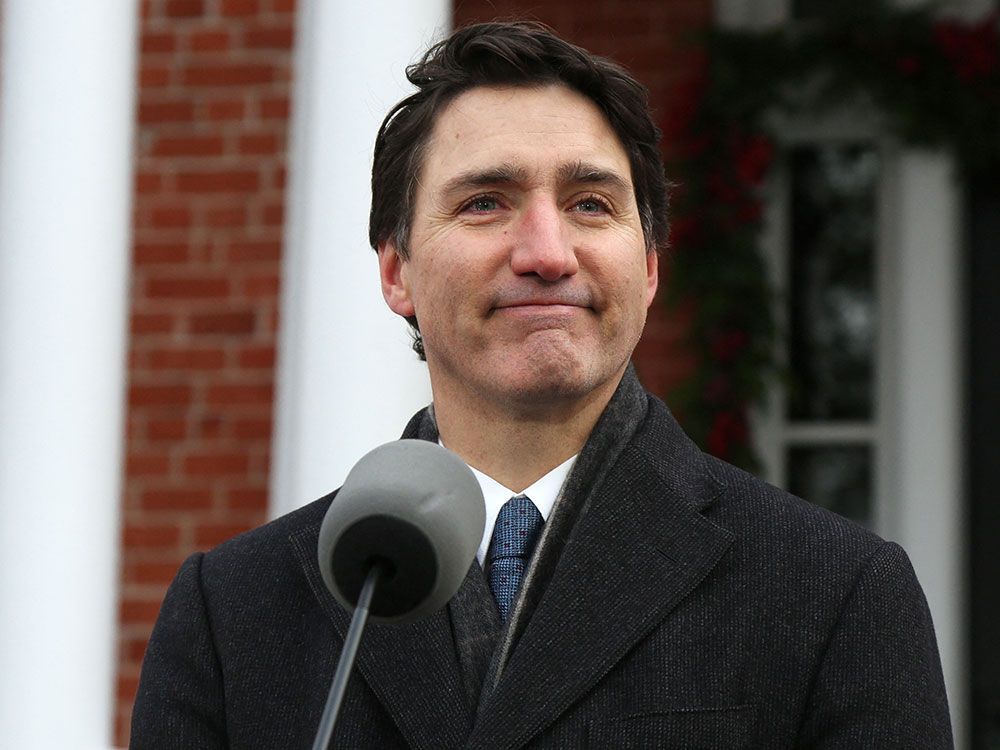Leftists often hate religion but love what religious people do. But what religious people do cannot be replaced
Get the latest from Father Raymond J. de Souza straight to your inbox
Published Dec 29, 2024 • Last updated 0 minutes ago • 4 minute read

On that fateful Friday when Ottawa was gearing up for the following Monday’s fall economic statement, all attention was on the finance minister, who, we discovered later, had been fired that very day by the prime minister via Zoom. Justin Trudeau had set something of a time-delayed explosive, not to take effect until after Chrystia Freeland delivered Monday’s statement. But instead she blew up the government. Understandably so.
Advertisement 2
THIS CONTENT IS RESERVED FOR SUBSCRIBERS
Enjoy the latest local, national and international news.
- Exclusive articles by Conrad Black, Barbara Kay and others. Plus, special edition NP Platformed and First Reading newsletters and virtual events.
- Unlimited online access to National Post and 15 news sites with one account.
- National Post ePaper, an electronic replica of the print edition to view on any device, share and comment on.
- Daily puzzles including the New York Times Crossword.
- Support local journalism.
SUBSCRIBE FOR MORE ARTICLES
Enjoy the latest local, national and international news.
- Exclusive articles by Conrad Black, Barbara Kay and others. Plus, special edition NP Platformed and First Reading newsletters and virtual events.
- Unlimited online access to National Post and 15 news sites with one account.
- National Post ePaper, an electronic replica of the print edition to view on any device, share and comment on.
- Daily puzzles including the New York Times Crossword.
- Support local journalism.
REGISTER / SIGN IN TO UNLOCK MORE ARTICLES
Create an account or sign in to continue with your reading experience.
- Access articles from across Canada with one account.
- Share your thoughts and join the conversation in the comments.
- Enjoy additional articles per month.
- Get email updates from your favourite authors.
THIS ARTICLE IS FREE TO READ REGISTER TO UNLOCK.
Create an account or sign in to continue with your reading experience.
- Access articles from across Canada with one account
- Share your thoughts and join the conversation in the comments
- Enjoy additional articles per month
- Get email updates from your favourite authors
Article content
Also understandable, little attention that fraught Friday was paid to the public advice given to the finance minister that same day. The standing committee on finance released its “Pre-Budget Consultations in Advance of the 2025 Budget,” tabling it in the House of Commons. They did it in person, not via Zoom.
The committee holds many hearings during the fall, inviting various experts, advocates and rent-seekers to make their case that the government should do this or that thing. This fall’s parade was impressive, ranging from the Convenience Industry Council of Canada — arguing that convenience stores should be able to sell nicotine patches — to the École de technologie supérieure, arguing that the government ought to fund the research of, not surprisingly, École de technologie supérieure. It’s that kind of process.
The committee bundles it all up, decides what recommendations to adopt, and then reports it all to the House. Supposedly, the minister finance takes all of this into account when drafting her budget.
It’s not a careful exercise in policy analysis. The recommendations are a few lines at best, and there were a whopping 462 of them.
By signing up you consent to receive the above newsletter from Postmedia Network Inc.
Article content
Advertisement 3
Article content
The Liberals, NDP and Bloc Québécois have a majority on the committee and so approved the long list, which included this, for example, at recommendation 339: “Create a fund dedicated to improving tourism infrastructure vis-a-vis electric vehicle charging stations in rural areas enabling Canada to meet its 2030 Emissions Reduction Plan.”
Peter Fonseca, MP for Mississauga East-Cooksville and the chair of the committee, wants to spend federal money to provide vehicle chargers in the forest for his constituents who go camping in Algonquin Park. It’s the kind of thing urban liberals think that rural conservatives need.
But what possibly prompted Fonseca to rally his Liberal-NDP-Bloc members in favour of this massive change to Canada’s charitable sector, just days before Christmas?
“Recommendation 429: No longer provide charitable status to anti-abortion organizations.”
“Recommendation 430: Amend the Income Tax Act to provide a definition of a charity which would remove the privileged status of ‘advancement of religion’ as a charitable purpose.”
As to the first, it is a relatively small amount of money, but makes a significant difference in the lives of those who need charitable assistance in difficult circumstances. It is not very pro-choice for Fonseca & Co. to extend charitable tax treatment to agencies that assist women in having abortions, but not to organizations who help them keep their babies.
Advertisement 4
Article content
We have been down this Liberal road before, when the Trudeau government required applicants for the Canada Summer Jobs Program to attest that they shared the government pro-abortion views. A policy that government benefits are only available to those who take the government line is illiberal in the extreme but true to form.
The second recommendation would be absolutely cataclysmic in its impact. Almost 40 per cent of Canada’s registered charities advance religion. The finance committee proposes to deny two out of every five charities their tax status. That would include the Salvation Army, which some of the committee MPs no doubt praise on their way in and out of supermarkets this season.
The committee proposes the obliteration of the charitable sector.
My colleagues at Cardus, keenly sensing that this absurdity was in the air, released a report last month on the socio-economic contribution of religious congregations. They have been measuring this for years.
Cardus calls it the “Halo Effect,” the dollar value of a congregation’s socio-economic contribution. For 64 Christian congregations in Canada, Cardus calculated that their Halo Effect is more than 10 times the value of the tax exemptions and credits, on average. The net-positive socio-economic contribution — Halo Effect, minus the value of tax exemptions and credits — of all religious congregations in Canada is an estimated $16.5 billion.
Advertisement 5
Article content
Even a high-spending government like the current one would find it difficult to find $16.5 billion per year to make up for lost social services, poverty alleviation and community-building.
Leftists often hate religion but love what religious people do. But what religious people do cannot be replaced. Sally Ann doesn’t stand for Secularist Atheists.
Fonseca’s proposal is not only counterproductive, but foolish. Religious Canadians, with their vast array of good works, are often political progressives, too; the social gospel is not a left-right matter. The finance committee should not be trying to make it such.
Fonseca and his colleagues may think that they are using the state to punish conservatives, which is unworthy of their office. But they are also punishing their own civic-minded and service-providing religious voters. Fonseca added his own Friday foolishness to the Zoom call from Trudeau to Freeland.
One expects that Dominic LeBlanc, should he still be finance minister at budget time, will reject the invitation to eviscerate Canada’s charitable sector. But voters ought to remember what Fonseca and his colleagues were up to, despite it all being forgotten that Freeland Friday.
National Post
Recommended from Editorial
-

Raymond J. de Souza: Trudeau and police send wrong signals to Jews and resident Hamas supporters
-

Raymond J. de Souza: Chariots of Fire's Eric Liddell personified the Olympic ideal — and Christian spirit
Article content
Get the latest from Father Raymond J. de Souza straight to your inbox
.png)
 1 week ago
15
1 week ago
15




































 Bengali (BD) ·
Bengali (BD) ·  English (US) ·
English (US) ·